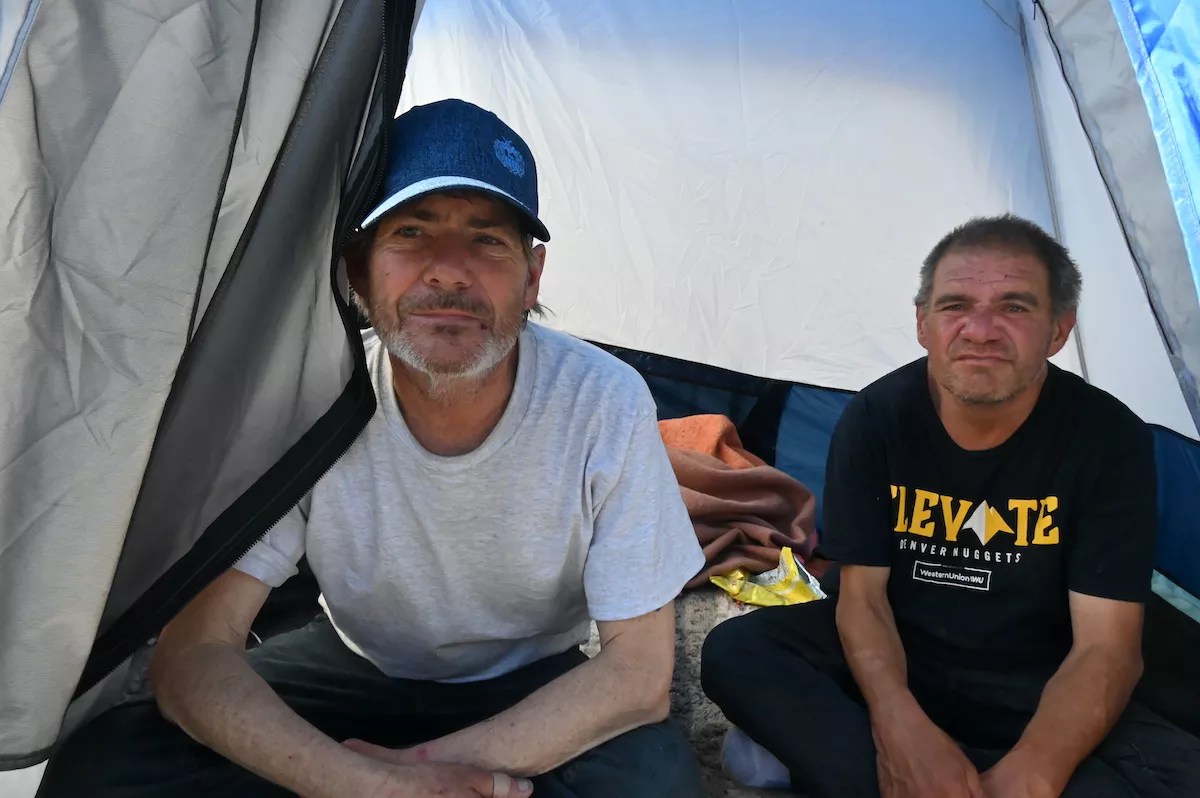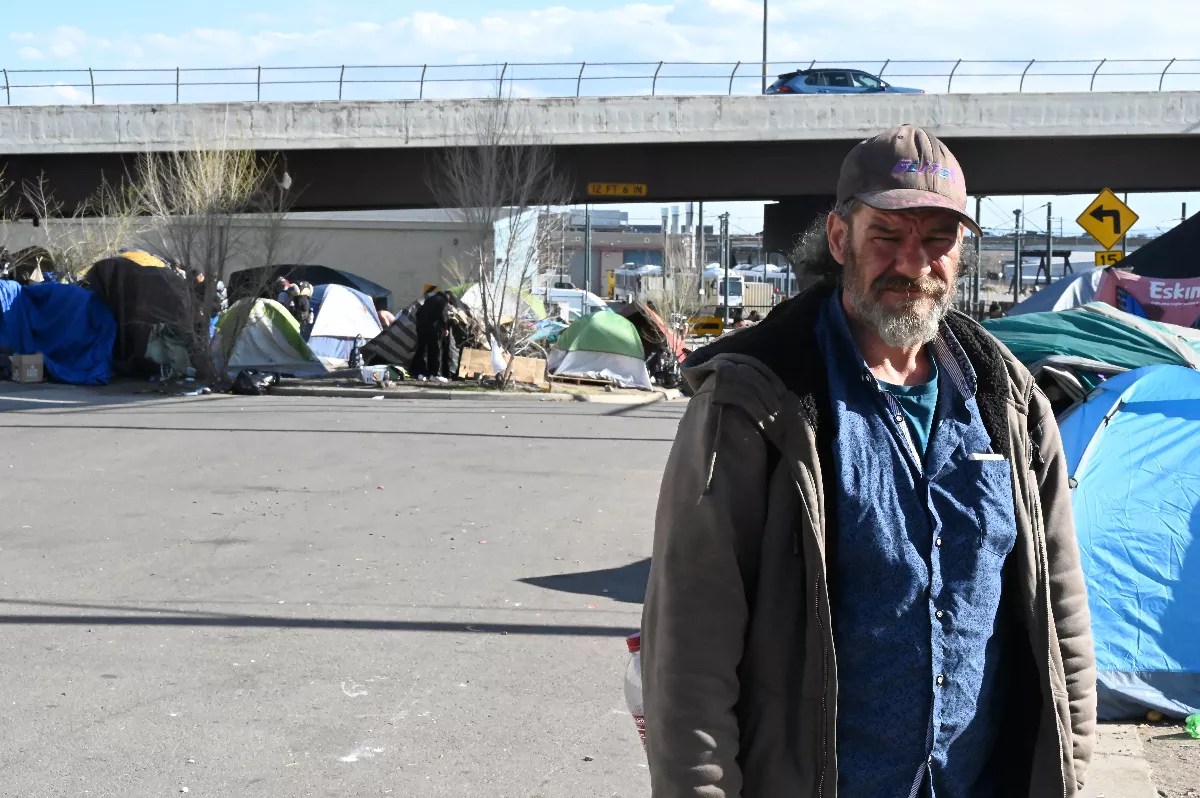
Bennito L. Kelty

Audio By Carbonatix
Pressured by a rapidly growing homeless population at La Alma Lincoln Park neighborhood, Mayor Mike Johnston asked for a sweep this week of what he calls an “unsafe” and “massive” encampment, but without anywhere to put the 140 people living there. For the past six months, there’s always been a place to put those displaced by a sweep.
“Unfortunately, that encampment has grown so large in the last ten days – there are now about 140 people there – it’s too large for us to move them all into housing,” Johnston tells Westword. “We’re going to have to close the encampment right now, move the folks to other locations, and then, as we have units become available, we’ll move people into housing.”
The encampment wraps around an underpass below the West Eighth Avenue bridge and along a section of Navajo Street in the La Alma neighborhood that is cut off by an RTD maintenance facility, making it slightly hidden and removed from residences. There were around forty people at the encampment at first, but it tripled in size over the past ten days, according to Johnston.
The La Alma encampment will be swept on April 16, seven days from when a notice was posted on Tuesday, April 9. (The City of Denver has to give one week’s notice before a sweep, per a 2019 U.S. District Court settlement.)
During a town hall with La Alma residents on April 9, Johnston said that no one moved from the encampment will get housing, despite the city’s efforts to find spots.
“That is our focus, when we do closures, to connect people to housing,” said Johnston, who used to live in the La Alma neighborhood. “But we have always said we will still occasionally have to close encampments when we have right-of-way infringements, we have public health and safety risks, or we have another public-health emergency.”
Upwards of ninety people attended the meeting, where residents reported seeing drug users injecting near their homes, feces on their property, and graffiti and littering around the neighborhood.

Mayor Mike Johnston talks to La Alma residents about a 140-person homeless encampment in their neighborhood during an April 9 town hall at the Denver Inner City Parish with Councilwoman Jamie Torres.
Bennito L. Kelty
“I know you’re trying to help them – and I appreciate that – but who’s helping us?” La Alma resident Brenda Bly asked the mayor. “They’re defecating in the alleys. This is horrendous. I can’t even open my gate without feces; there are needles. There was a poor boy sitting in the alley, took his sock off, and he was getting ready to inject himself. That could have been my son.”
“We’ve all had stolen lights from our yards, broken locks from our electrical outlets, knives in our driveways, dumpsters set on fire,” Jason Nutile, a La Alma resident, tells Westword. “I’m just concerned about the well-being of them and of the neighbors down here.”
Nutile says he hasn’t forgotten that one of his neighbors, Johnathan Douglas, was murdered by a homeless man a year ago during a robbery in the 1200 block of Mariposa Street in La Alma.
“We’re terrified,” Bly says. “I’ve been chased. I’ve been threatened.”
Johnston told Bly that the city is closing the encampment over safety concerns. “It’s not safe for you,” he added. “It’s not safe for the residents. It’s not safe for the folks living in the encampment.”
The west Denver neighborhood is represented by District 3 Councilmember Jamie Torres, who says that she called for the town hall so that residents “know the mayor and city departments are paying attention to homelessness in the neighborhood and are not turning a blind eye.”
“Since I came into office in 2019, there were longstanding concerns about encampments,” Torres says. “This neighborhood has stepped up. I want to be sure they know that the mayor acknowledges that and commits to working with residents for a long-term solution.”
Torres says she’s seen La Alma “open its arms” by hosting programs like two Safe Outdoor Spaces, the Denver Housing Authority’s Mariposa redevelopment, and the upcoming Mercy Housing’s Permanent Supportive Housing project.
The mayor says he would have preferred to wait until housing opened up before conducting the sweep, but it grew too fast and became a public health and safety hazard before his newest homeless resolution initiative, All In Mile High, could gain steam.
“This was just a large encampment that came still very early in the process,” Johnston says. “That’s why we weren’t able to get ahead of it fast enough.”

Rick Mitzen stands in front of the homeless encampment at Eighth Avenue and Navajo Street, where he lives with his wife.
Bennito L. Kelty
New Housing Progam Off to Slow Start
Johnston says the encampment grew so quickly because people caught wind that the city might offer housing at the site, as it did with House1000.
“What we know happens right now, unfortunately, is when we started having conversations with people in the encampment, word gets out, [and] many community members or advocates say, ‘Everyone should go to this site because there will be housing available,'” Johnston explains. “And it goes from forty people to 140 people in a couple days.”
Rick Mitzen and his wife, Sharron, have been homeless for five years after losing everything to Hurricane Harvey in 2017 in Texas. They now live at the La Alma encampment, and Rick says he wants to tell La Alma residents that they’re sorry for the fears about the encampment, but admits they need help.
“We apologize for being in the way, but we don’t know where else to go or what else to do,” Mitzen says. “I definitely don’t want to be out here. We need help. I don’t know what kind of help we need.”
Michael Dixon and Randall McAda, who are both homeless, have been at the encampment for a month after they “just happened to come across it,” McAda says. When they first arrived, the encampment had only three tents, Dixon adds.
Despite the encampment getting crowded, they’re both staying put in hopes of being swept.
“We’re just waiting to get swept so maybe we can get some sort of housing,” McAda explains. “I’m almost sixty years old, and I’m too old to be living like this. I’m on disability. I get monthly income, but still, I can’t afford to get an apartment because it’s so expensive.”
Dixon is 46 years old and lost all the toes on his right foot to frostbite during the last two months. Dixon says he’s been living on the streets for 25 years; McAda has been homeless “off and on for a couple years,” he says.
Unlike previous sweeps, the city won’t put up fencing afterward, allowing the encampment to grow again in hopes of offering housing later. But like the rest of the La Alma encampment, McAda and Dixon won’t be offered housing before being swept next week.
“We really need to intervene when these encampments are small and move them to housing when they’re small,” Johnston says. “And not have people – even well intended – encourage people to make encampments larger and larger, because they’re harder to serve that way.”
Encampments have grown for this same reason before, “but not to this volume,” Johnston says.
Johnston admits he is “frustrated” that he has to move the La Alma encampment before housing is available, adding that it’s “the first time in six months we’ve had to close an encampment and not be able to connect people to housing.”
Last November, the city swept an encampment that surrounded the U.S. Post Office near 21st and Curtis streets without being able to offer a place to sleep, but the city came back to the location in December to move 145 people into temporary housing.
“October and November, we were regularly opening new hotels with 200, 300, 400 units available,” Johnston says. “We could take big, huge chunks of encampments and move them.”
As a result of House1000, which was renamed All In Mile High earlier this year, the city has about 1,300 housing units occupied by residents formerly living at encampments, though some came in via referrals. Johnston says that All In Mile High is moving at a different pace and opening fewer units at a time, in part because of budget challenges related to the migrant crisis.
“We’ve had some budget challenges we’re facing this year, so we’re not buying new hotels right now,” he says. “We’re not adding 300 units at a time. Our unit supply will really come from moving folks at our current sites into ongoing housing.”
The House1000 plan cost the city about $10.3 million, a fraction of the $48.6 million that Johnston expected to spend in September, but that only covered most of the sweeps, hotel purchases and housing during the last two months of the year. The remaining $38.6 million that was budgeted for House1000 will go toward All In Mile High, which has a budget of $75 million.
Residents who got housing through House1000 are given three to six months to stay in a non-congregate shelter as well as an ID, addiction or mental health support, job application help and a one-month deposit for an apartment, according to the mayor.
Johnston says his administration will let the La Alma encampment grow for a few weeks after it’s swept and return when more units are vacant, which should be soon, because the first people to get units from House1000 six months ago are about to time out. He says that the city will have more units ready near the start of May.
“As we start to get more people moved out, that’ll create more openings in our All In sites,” Johnston says. “A big rush of people came in [via House1000] in December. Almost 800 people came in one month alone. So those folks are all kind of on a six-month timeline, which means coming April, May, June, we think more of those folks will be ready to move on.”